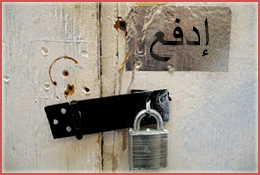-
Thanks Karen, once again, you took the words right out of my keyboard :)
Mohamed and Ehab (ايهاب ...correct writing as you mentioned?), thanks for not forgetting about us ladies tonight ;-)! I was in stitches about the "push the finger story" and maybe you will be surprised to hear that there is a similar "tradition" here in Bavaria :cheese:
Greetings from my study desk, which has finally moved out on the balcony!!!! -
Aaaand I just realised I fell into the trap of push and pull... of course it is the "pull the finger" story.... (whereas here it would be the "push the finger" story, :) ) نحلة اسفة
;-) -
Hi Na7la, Hi All,
Someone from Hamburg tried that "pull the finger" trick on me years ago. I'm glad I have been blissfully ignorant of the fact that it was a tradition here in Bavaria and elsewhere, too ... -
A literal translation of the third sentence would read: Written on the door "pull". In English this can be rendered in two ways:
(1) The sign on the door says "Pull".
(2) The door says "Pull".
Numerous examples of both constructions can be found on the Internet.
The English also personify signposts. Examples:
(1) There was an ancient signpost near the bridge that said: "Everwell 4 mls" (...) (J.B. Priestley, The Good Companion)
(2) A signpost to the right says "Ambleside, 7 miles". (The Observer 30.8.1998: 32)
In this domain animistic constructions seem to be less common in Arabic than in English. I wonder whether the word "maktuub" (written) would be used in the Arabic equivalents of the sentences I've just quoted from "The Good Companion" and "The Observer". -
I have a quick question about the third sentance which reads "منذ البداية وانا". What is the function of the "wa"? Does the sentance make sense without it? That's how I would have said it... منذ البداية انا ادفعه. Does that still make sense? Also, are "pay" and "push" said exactly the same way?
-
Interesting point, without the (wa) the sentence would indeed sound wrong. In Arabic, when you have a time event (specially with munthu) and you want to link an action to it, you add the linking (wa), like:
منذ ساعة و أنا أنتظرك
منذ وقت طويل و رجلي تؤلمني
And your second point is important as well, (إدفع) is used to mean Push and Pay, so you say (إدفع الثمن) and (إدفع السيارة). -
Regarding animistic constructions (if I'm correct in understanding the meaning), I once had the great good fortune of visiting the British Museum with a friend who was an expert in early Roman and Greek culture. I was amazed when he pointed out, so called, speaking artefacts such as a Greek pot inscribed with ' Xxx (I forget the name!) made me'. Also there were pieces with meaningless words, added because, in a largely illiterate time, letters were considered to be imbued with inherent magical power. The other interesting point was that literate people in those times automatically vocalised what they read so that important inscriptions such as eulogies were added with the sure knowledge that they spoken each time they were read.
Nowadays, aside from giving boats and, sometimes, cars names, our worldview of 'aliveness' is rather more limited although there isn't the same degree of linguistic distinction between humans and other animals in English, compared to Arabic. -
Dear Ehab and Mohd:
دفع seems to be the words for "push" and "pay..." Are they pronounced the same? -
Yes @Shebab, so you can say (dafa3a arrajul almaal - the man paid the money) and (dafa3a arrajul assiyyaarah - The man pushed the car).
-
I have question for the use of يفتح in the first sentence. It is pronounced as yafta7. I am bothered if it is active or passive.. I mean shouldnt it be something like yufta7 ؟؟
-
@frhn, if you pronounced it as yufta7 then it becomes passive voice.
يَفْتَحُ - Active
يُفْتَح - Passive
In the dialogue the verb should not be passive because we know that subject A is trying to open the door
Lower Intermediate - It says pull
| June 8th, 2010 | 1 comment |
What do you expect to happen when you walk up to a door and push it? We all agree to the answer of the door opening, but sometimes things don't go to plan. Tune in to learn plenty of useful, and new, vocabulary as well as finding out more about this odd situation with the door.
 |
 MP3 Download MP3 Download
 PDF Transcript PDF Transcript
|
 Audio Transcript Audio Transcript Exercise Exercise |
|
| Basic | Premium | |
|---|---|---|
Join the Discussion

Random Word
خطأ |
|

Advertisement



I was revising some "older" lessons when this one suddenly popped up.